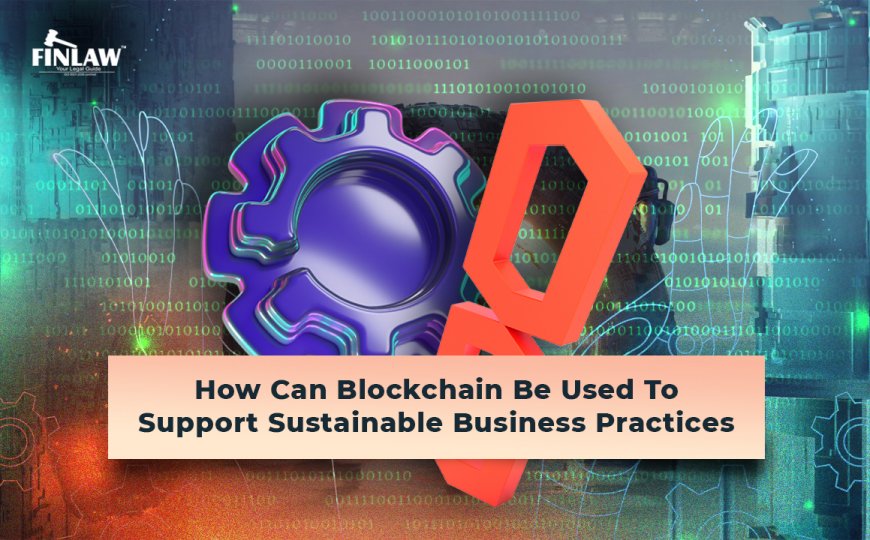How Can Blockchain Be Used to Support Sustainable Business Practices?
Discover how blockchain can support sustainable business practices in India through traceability, clean energy, ESG reporting, and ethical sourcing.

In a world increasingly focused on environmental and social impact, businesses are under pressure to adopt more responsible practices. India, with its booming economy and growing emphasis on sustainability, is at a crucial crossroads. One of the technologies gaining traction in this space is blockchain.
But how can blockchain be used to support sustainable business practices, particularly in the Indian context?
This article explores how blockchain can drive transparency, traceability, ethical sourcing, clean energy adoption, inclusive finance, and reliable ESG reporting—paving the way for a more sustainable and accountable business ecosystem in India.
Understanding Blockchain and Its Relevance to Sustainability
Blockchain is a decentralized, tamper-proof digital ledger that records transactions across multiple systems in real-time. Each entry is verifiable and immutable, making it a powerful tool for creating transparent and accountable systems.
In sustainability-focused business operations, blockchain helps by:
-
Creating transparent supply chains.
-
Authenticating sustainable practices.
-
Tracking emissions and energy consumption.
-
Enhancing accountability in ESG reporting.
-
Enabling responsible consumer choices.
With sustainability becoming a business imperative, blockchain offers Indian companies a way to align their operations with global environmental and ethical standards.
1. Transparent and Traceable Supply Chains
One of the biggest challenges in sustainable business is verifying the origin and journey of raw materials. Blockchain enables end-to-end visibility across supply chains, from raw materials to final products.
Use Case: Blockchain in Indian Agriculture
Startups like TraceX Technologies are already working with Indian farmers to enable blockchain-based farm-to-fork traceability. Farmers can record inputs such as organic fertilizers, water usage, and pesticide application. This not only builds consumer trust but also opens access to premium markets where sustainability certifications are mandatory.
Use Case: Sustainable Cotton and Textiles
Blockchain enables garment manufacturers to trace cotton back to the farm, verifying whether it's sustainably sourced. In India, where the textile industry plays a significant role in exports, blockchain can enhance credibility with international buyers who demand transparency.
2. Clean Energy Tracking and Carbon Credit Verification
India is pushing aggressively toward clean energy adoption through solar, wind, and hydropower. Blockchain supports this transition by enabling the transparent trading of renewable energy and authenticating carbon credits.
Peer-to-Peer Renewable Energy Trading
In smart cities like Bengaluru and Pune, residential solar panel owners can use blockchain platforms to sell surplus energy directly to others. Each transaction is recorded on the blockchain, ensuring fair pricing and real-time energy tracking.
Carbon Credit Tokenization
Companies in sectors like cement, steel, and manufacturing can tokenize their carbon offsets and validate them using blockchain. This ensures that each offset is credible and traceable, aligning with global emissions-reduction targets.
3. Promoting a Circular Economy
The circular economy emphasizes the reuse, repair, and recycling of materials to minimize waste. Blockchain can capture every stage of a product’s lifecycle—from raw material extraction to end-of-life recycling.
Waste Management in Indian Cities
Blockchain can be integrated into waste management systems in metropolitan cities like Mumbai and Delhi to track e-waste, plastics, and construction debris. This would make it easier for municipal corporations to meet their sustainability targets under programs like Swachh Bharat Mission and Smart Cities.
Extended Producer Responsibility (EPR) Compliance
Under India’s EPR rules, producers are accountable for collecting and recycling their products post-consumption. Blockchain helps verify if companies have met these obligations and allows regulators to audit the data with ease.
4. Financial Inclusion and Ethical Trade
Blockchain has a crucial role in democratizing access to markets and financial services, especially for underserved rural populations and small-scale producers.
Transparent Payments for Farmers
By integrating blockchain into agriculture marketplaces, smallholder farmers in India can receive fair and timely payments. Smart contracts can automatically release payments when quality and delivery checkpoints are confirmed, eliminating middlemen.
Empowering Artisans and Local Entrepreneurs
For craftspeople in regions like Rajasthan and Odisha, blockchain can certify the authenticity and origin of handmade goods. This promotes ethical trade, enhances visibility on global platforms, and ensures that artisans receive their due share.
5. Real-Time ESG Reporting and Green Finance
Environmental, Social, and Governance (ESG) reporting is becoming mandatory for large corporations in India. Blockchain can help maintain tamper-proof, auditable records of sustainability initiatives.
Enhanced ESG Accountability
By recording sustainability KPIs—such as water usage, energy savings, or employee welfare—on a blockchain, businesses can ensure transparency and build trust with investors, regulators, and consumers.
Green Bond Assurance
When companies issue green bonds to fund eco-friendly initiatives, blockchain can be used to track the allocation of funds in real-time. This level of financial integrity assures investors that their capital is being used responsibly.
6. Government Adoption and Public Infrastructure
The Indian government is taking steps to integrate blockchain into public systems, which can indirectly support sustainable development goals.
Blockchain for Land and Forest Records
States like Telangana and Maharashtra are piloting blockchain-based land records. Accurate records prevent illegal deforestation and help enforce conservation laws more effectively.
Strengthening the Public Distribution System (PDS)
Blockchain can enhance transparency and reduce leakage in India’s PDS by tracking the distribution of grains and essentials. This ensures that government subsidies reach the intended beneficiaries, particularly during natural disasters or pandemics.
7. Authenticity and Consumer Awareness
Indian consumers, especially urban millennials, are becoming more conscious of the ethical and environmental impact of their purchases. Blockchain enables brands to meet this demand.
Authentic Indian Tea and Spices
The Tea Board of India and other bodies are exploring blockchain to verify the origin and quality of exports like Darjeeling tea and Kerala spices. This helps eliminate counterfeiting and assures customers of the authenticity and sustainability of products.
Opportunities for Indian Businesses and Startups
Startups, MSMEs, and large corporations in India can leverage blockchain to:
-
Build trust and brand loyalty through transparent practices.
-
Comply with ESG and sustainability regulations.
-
Expand into global markets that demand supply chain traceability.
-
Access green finance and carbon markets.
-
Collaborate on shared sustainability goals through consortiums.
The Indian government’s focus on Digital India, green infrastructure, and startup growth is creating a conducive environment for blockchain innovation.
Challenges and Considerations
While promising, blockchain adoption comes with challenges:
-
High initial setup costs.
-
Limited technical awareness among small businesses.
-
Regulatory uncertainty, especially around crypto assets.
-
Environmental concerns related to energy usage in blockchain networks (although new models like Proof-of-Stake are energy efficient).
Businesses must carefully evaluate the right use cases and platforms that align with both their sustainability goals and compliance frameworks.
Conclusion: A Sustainable Future with Blockchain
So, how can blockchain be used to support sustainable business practices in India? By enabling traceability, accountability, and trust across industries, blockchain is a powerful catalyst for responsible growth. Whether it's verifying ethical sourcing, authenticating carbon credits, or ensuring transparent ESG reporting, blockchain offers Indian businesses a competitive edge in the global sustainability movement.
As both public and private sectors in India embrace digital transformation, blockchain will be a foundational pillar in building a greener, fairer, and more sustainable economy.
Frequently Asked Questions
Q1: Is blockchain technology itself environmentally sustainable?
Modern blockchain platforms use energy-efficient consensus mechanisms like Proof-of-Stake, making them more sustainable than traditional Proof-of-Work systems.
Q2: Which sectors in India are most ready to adopt blockchain for sustainability?
Agriculture, energy, manufacturing, textile, public utilities, and logistics are leading the way.
Q3: Are there any Indian regulations supporting blockchain for ESG or sustainability?
While there's no unified regulation yet, initiatives under MeitY (Ministry of Electronics and Information Technology) and RBI’s blockchain trials are encouraging its adoption in sectors like supply chain, identity, and agriculture.
What's Your Reaction?



















